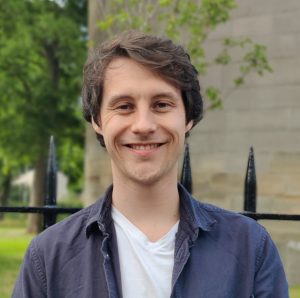
MELVILLE, N.Y., July 23, 2025 — APL Quantum and AIP Publishing are honored to announce Sven Stengel, a PhD candidate at Heriot-Watt University, has won the first-ever APL Quantum-META Best Paper Award.
Awarded in conjunction with META, the international conference series on Metamaterials, Photonic Crystals, and Plasmonics, the award is meant to honor and bring visibility to groundbreaking quantum research in metamaterials and nanophotonics.
The winning paper, “Enhanced quantum emission via epsilon-near-zero materials,” was a joint effort from Stengel, his colleagues at Edinburgh’s Heriot-Watt University, and collaborators from the Birck Nanotechnology Center at Purdue University.
“This reward is a huge honor for me, and at the same time, I want to acknowledge the team involved in the work — which, in my opinion, is important for the interesting findings of this collaborative project,” said Stengel. “I am glad to receive this award on behalf of our team, an international collaboration between Heriot-Watt and Purdue University, under the supervision of Professors Vladimir M. Shalaev, Alexandra Boltasseva, and Marcello Ferrera.”
According to APL Quantum Editor-in-Chief Prof. Ortwin Hess, the team’s paper exemplifies precisely the groundbreaking and interdisciplinary research APL Quantum aims to highlight: an innovative approach in harnessing epsilon-near-zero materials as a substrate that dramatically enhances quantum emission properties, achieving impressive improvements in emission directionality and intensity, as well as a remarkable thirty-fold lifetime reduction.
“Celebrating this work during the International Year of Quantum underlines APL Quantum’s commitment to bridging between theoretical innovation and real-world quantum technology implementation,” said Prof. Hess. “Stengel’s research not only addresses fundamental scientific questions but also offers practical pathways to transformative technologies essential in Quantum 2.0 — where we move beyond Quantum 1.0’s basic understanding of the atomic world and into the active control of superposition, entanglement, and coherence.”
“Work like this has us on the verge of quantum computers with unprecedented power, quantum communication with unparalleled security measures, and quantum-enhanced sensors capable of dramatically elevating the precision of measurements across an array of fields,” he added.
Stengel, whose multidisciplinary background includes vocational training and work as an industrial mechanic, pursued his interests in applied engineering and problem-solving to a degree in automotive engineering from Germany’s BSZ Roth and eventually a B.S. in Physics from Heriot-Watt University, where he was awarded the 2023 Wallace Prize for best graduate. His current research focus is on the potential and applications of electrically conducting transparent glasses, transparent conductive oxides in nonlinear optics, and quantum optics.
Stengel noted the work that has been done in this field paves the way for novel applications, including ultra-fast pulse characterization and streaking for industry and research. Stengel intends to explore that field further. For now, he said his focus has shifted toward studying the fundamental properties of transparent conducting oxides in quantum optics and their use as a time-varying material. He also highlights the importance to further investigate the lower limit of the optical material response of transparent conductive oxides.
“I’m certain that we’re only scratching the surface in this field of research,” he said. “Since my partner is also a researcher in a similar field, research is to me like a family that should grow together, with ideas and controversial conversations to achieve new and novel ideas. Hence, one of the most important questions awaiting investigation regarding these materials in quantum optics is how they can be utilized optimally to enhance coupling between quantum emitters — and how to modify the spontaneous and stimulated emission properties within and around such materials.”
APL Quantum-META Best Paper Award nominations are evaluated based on presentation quality, research significance in advancing quantum technologies, and impact on UNESCO Sustainable Development Goals.
###
ABOUT APL QUANTUM
APL Quantum publishes cutting-edge and multidisciplinary research across quantum theory and fundamentals, quantum phenomena and resources, applied quantum science, and quantum technologies. The journal aims to bridge fundamental quantum research with technological applications and embraces theoretical as well as experimental research.
ABOUT AIP PUBLISHING
AIP Publishing’s mission is to advance, promote, and serve the physical sciences for the benefit of humanity by breaking barriers to open, equitable research communication and empowering researchers to accelerate global progress. AIP Publishing is a wholly owned not-for-profit subsidiary of the American Institute of Physics (AIP) and supports the charitable, scientific, and educational purposes of AIP through scholarly publishing activities on its behalf and on behalf of our publishing partners.
Contact:
Rob Press, Communications Manager
rpress@aip.org
